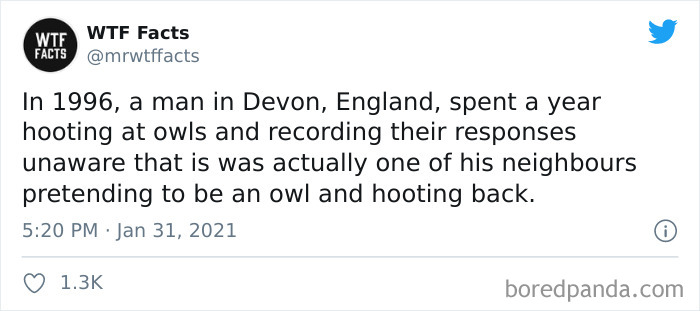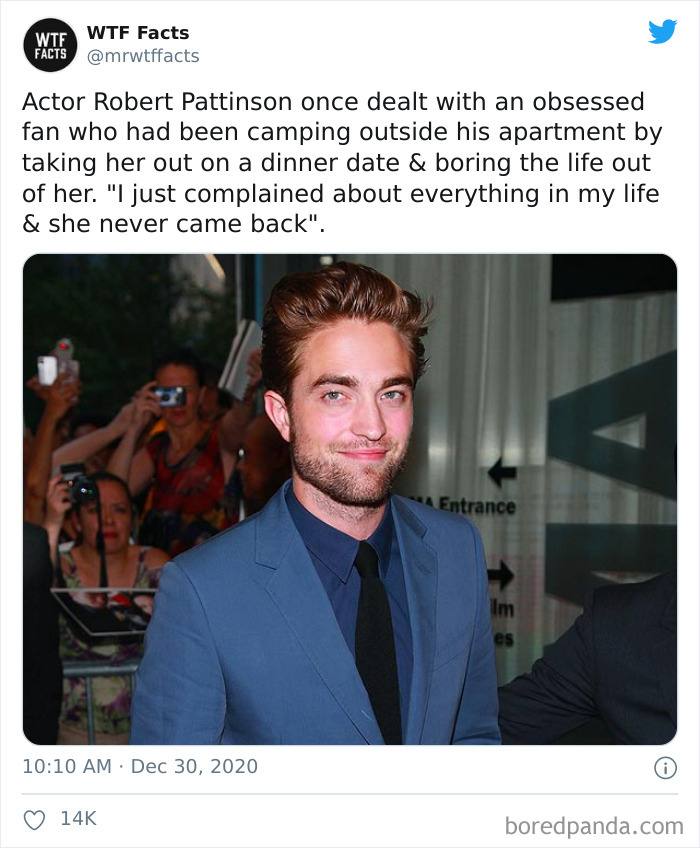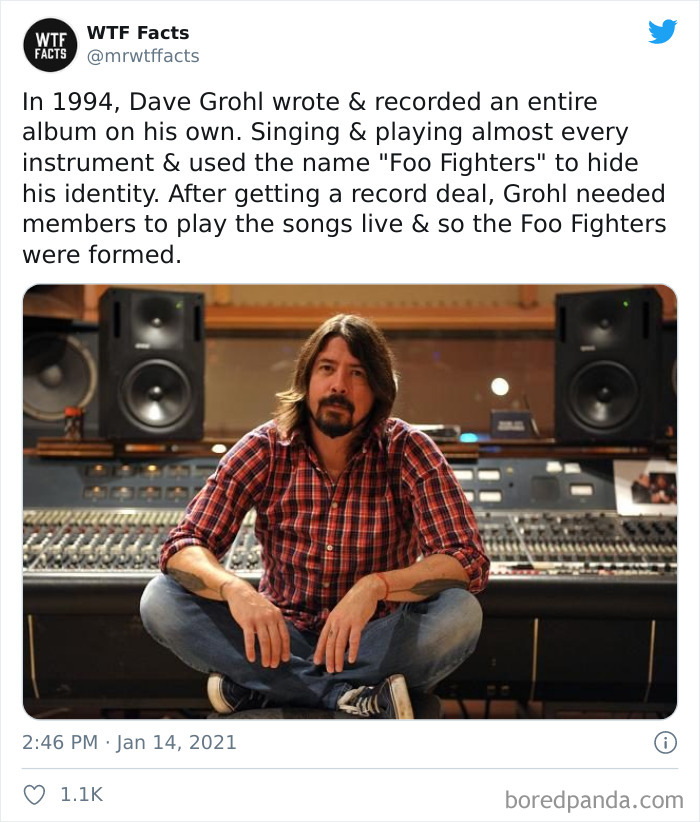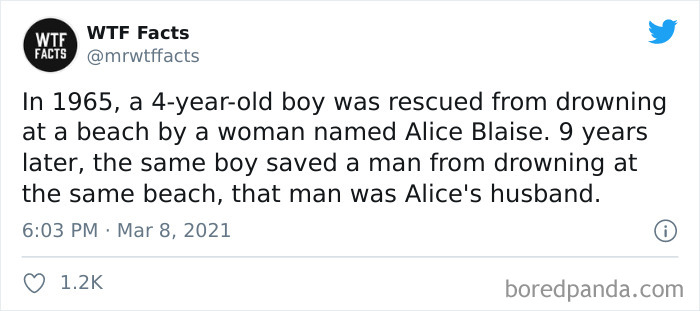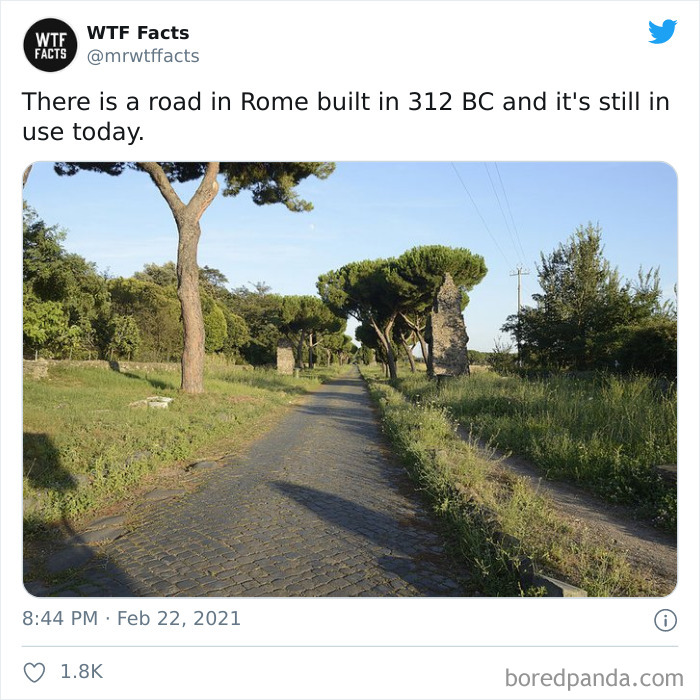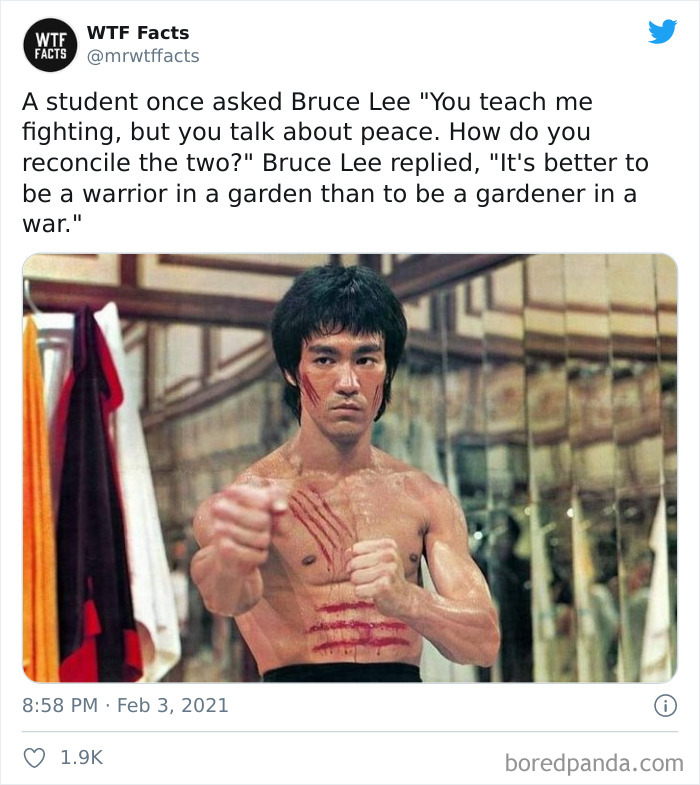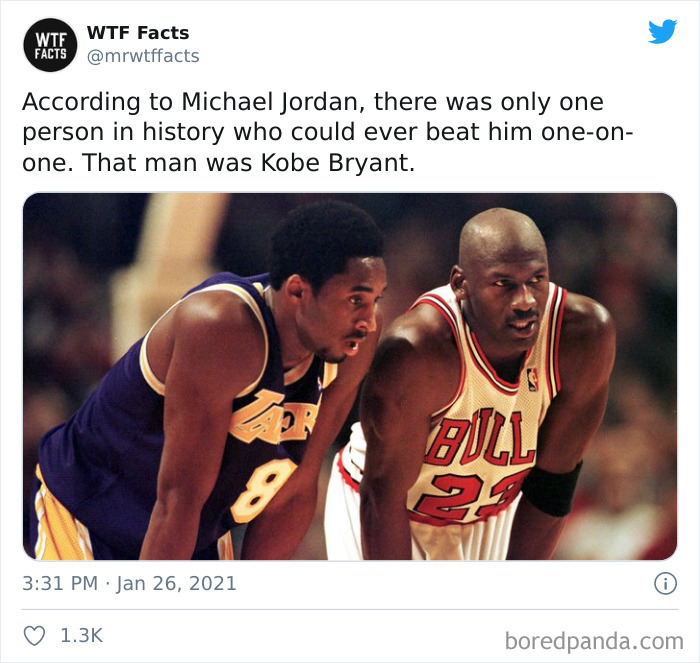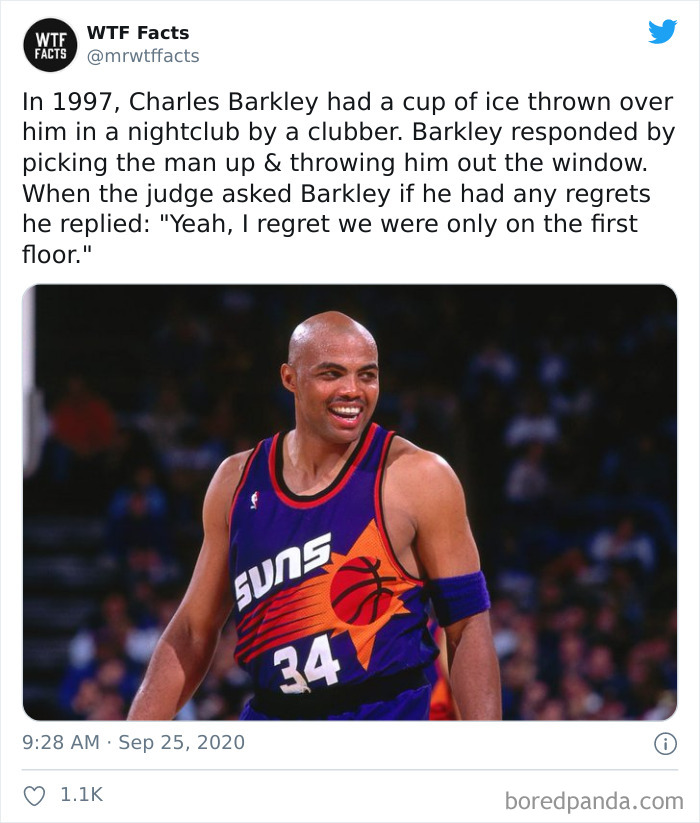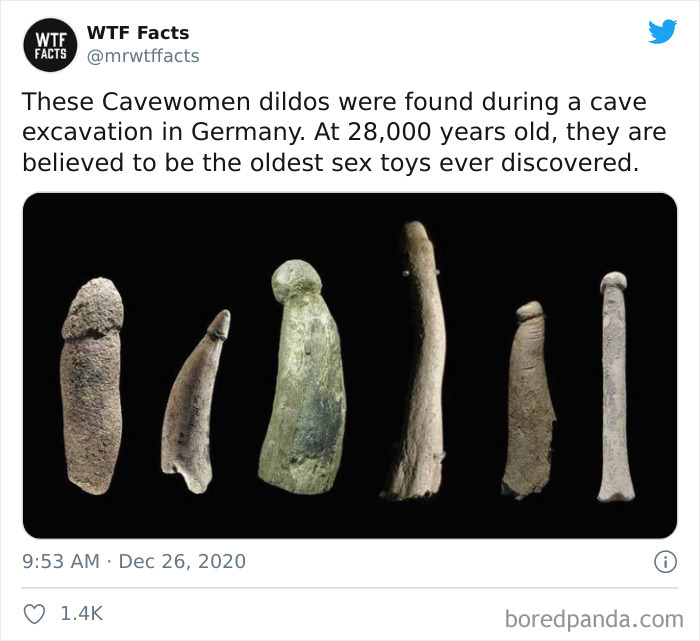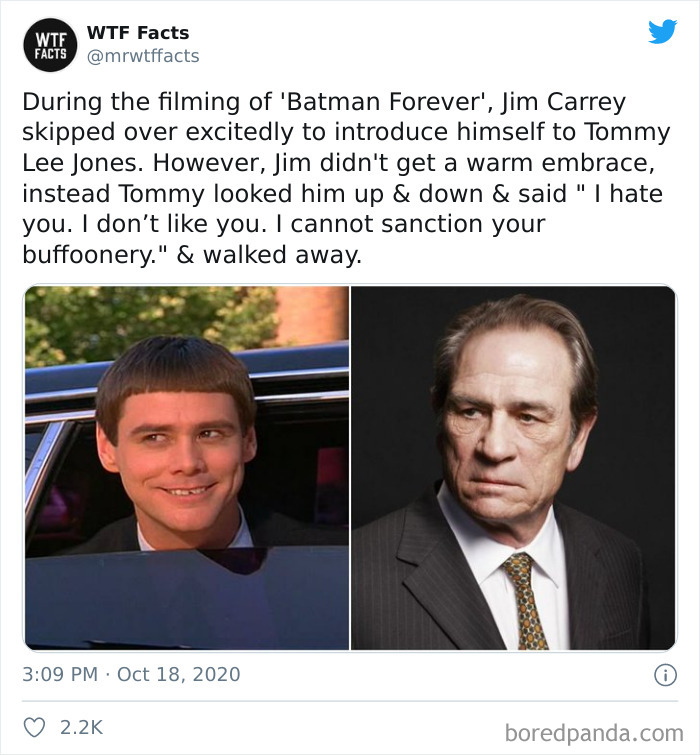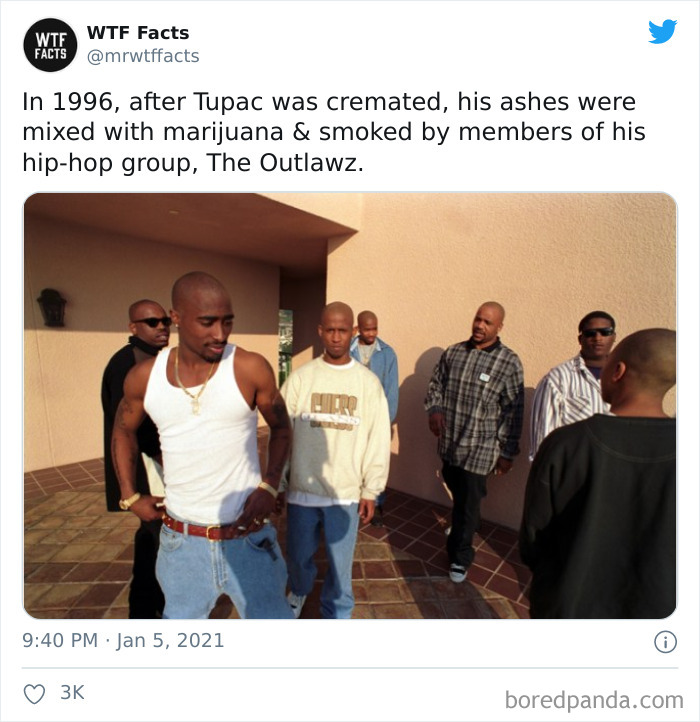While some of the things we learn don't necessarily make us smarter, they can definitely arouse our desire to learn more. Or at least help us continue our stalling conversations. And Twitter account WTF Facts is dedicated to collecting and sharing these random tidbits of information. From celebrity lifestyle to international relations, the project covers a wide range of topics, which is probably the reason why its feed remains so fresh and interesting. Continue scrolling and check out some of the most popular tweets WTF Facts have ever released!
This post may include affiliate links.
Knowing obscure facts isn't just fun. It's also good for our mental health. For example, experts say that playing trivia games can provide a dopamine rush much like gambling, but without the negative effects.
Even if our trivia games differ, the benefits are there. Whether we're playing Trivial Pursuit at home or attending a pub trivia night, the basic premise remains the same: we experience the thrill of providing correct answers to questions about lesser-known facts.
"You get a rush or a neuroreward signal or a dopamine burst from winning,” John Kounios, Ph.D., professor of psychology and director of the doctoral program in applied cognitive and brain sciences at Drexel University in Pennsylvania, told Healthline. “I think whenever you’re challenged with a trivia question and you happen to know it, you get a rush. It’s sort of like gambling.”
Not too dissimilar: Julia Roberts’ parents used to run an acting class which Martin Luther King’s children used to attend as it was one of the first integrated acting classes. When Julia was born, MLK and his wife, Coretta, paid the hospital bills when Julia was born to thank the couple.
Kounios said the benefits can also be similar to those of playing a video game.
However, unlike gambling and even video games, Kounios said trivia is generally not a problematic habit.
“I don’t think there are any pitfalls,” he said. “Like anything else that’s fun, it takes up time.”
A librarian from California, Sarah Kishler, loves trivia games and enjoys attending a monthly pub trivia night in which a team of librarians participates.
"Learning facts so that I can get better at trivia is definitely a passion of mine," she told Healthline. "Getting a question right is definitely very satisfying to me."
Same in Italy... You're allowed to disobey an order that you think is illegal...
Over the past decade or so, pub trivia nights that are popular in the United Kingdom appear to have grown in other parts of Europe and the United States.
Enthusiasts like Kishler enjoy getting to interact with people at these events, especially compared to electronic trivia games.
She has learned that doing well at these social trivia games gives her "a feeling of validation" and increases her self-esteem.
yeah Disney often adapts its stories to be appropriate for children, eventually leading everybody to only remember the Disney version and not the original
"I love general knowledge, geography, literature, music, science trivia," Kishler explained. "I just love to accumulate knowledge. I like the exercise that it gives my brain and memory."
She doesn't think of herself as a competitive person but nevertheless enjoys getting a bit amped up at trivia games.
“People really like to have some expertise on something and the brain is very good at focusing on things that you’re interested in,” Deborah Stokes, Ph.D., L.P.C., B.C.N., a psychologist in Virginia, who focuses on neurotherapy, told Healthline.
According to Stokes, learning large bodies of knowledge can often start with trivia. And people who are interested in trivia can be brainy, have a high IQ, and be smart on a lot of levels.
However, Kounios said that people aren’t necessarily better at trivia games just because they’re more educated.
I can barely draw a stick figure and if instructions have more than one step it is safer to write them down.
"Some people soak up facts,” Kounios added. "Plenty of people with a lot more education may not remember what they had for breakfast yesterday morning."
"In typical people, my observation, not backed up by any research, is that their interest in trivia is confined to topics that they are generally interested in. So if a person is very interested in history, then they may either seek out history trivia, or they might just naturally pick it up in the course of learning about nontrivial aspects of history."
I love Dave Grohl, but he isn't the only artist to have done this....
Stokes pointed out that trying to retain information about things we're interested in can be like a good exercise for the frontal cortex as the brain ages.
"That’s the first thing to go with injury or with age if we don’t use it," she said.
Of course, it's completely understandable if the pandemic has drained your brain of the desire to learn and flooded it with boredom and tiredness instead. In an earlier Bored Panda interview, Lenore Skenazy, the president of Let Grow and the founder of the Free-Range-Kids movement, said that before we can become curious again, we have to do the hard part: get off the couch. Force yourself out the door. Why? Because beyond your four walls, things are never exactly the same. Weather, animals, people, sounds, smells, clouds—they’re all swirling about."
Lenore continued: "Ask yourself to start noticing new things. I did that this morning with a friend. We took a walk around our neighborhood and started looking for interesting details in the homes and buildings we passed. It went from a walk down streets we’d seen a million times to a sort of treasure hunt. And the big thing we were really hunting for? Curiosity! When you’re curious you’re alive again—noticing, thinking, making connections. You can’t do that if there’s no new information coming in. So your first step is to force yourself out of a rut by leaving the house (harder during the pandemic, but not impossible)."
Oh my god, that's the worst dad joke ever, you have ascended to the Dad plane
Load More Replies...And think how they looked originally, encased in pure white limestone, topped with gold.
When I see pyramids I think of all the wear and tare that went into building it and the human lives that were used to build it!
It would have looked amazing when it still functionally generated electricity, before the illuminati intentionally trashed it to hide its true purpose
Every time I see the pyramids, I recall the slave labor that was used to build them. The incredible feat of engineering that was born of man. All without benefit of technology and modern machinery.
There is a consensus among Egyptologists that the Great Pyramids were not built by slaves. Rather, it was farmers who built the pyramids during flooding, when they could not work in their lands. Dieter Wildung, a former director of Berlin's Egyptian Museum, said it is "common knowledge in serious Egyptology" that the pyramid builders were not slaves. "The myth of the slaves building pyramids is only the stuff of tabloids and Hollywood," Wildung said. "The world simply could not believe the pyramids were build without oppression and forced labour, but out of loyalty to the pharaohs." Hawass said the builders came from poor families from the north and the south, and were respected for their work – so much so that those who died during construction were bestowed the honor of being buried in the tombs near the sacred pyramids of their pharaohs.
Load More Replies...I wondered if people climb the pyramid. The Egyptian government has outlawed climbing and banned dozens of tourists who tried. There have been over 80 deaths in the attempt.
There was one when I was there. He went to the top. The government gave him jail for five years or 10,000,- euro to pay and banned to come to Egypt for a lifetime . He was from the uk
Load More Replies...Can't even imagine back then- when you were WAAAAYYYY up there- and you forgot your lunch at the bottom and where is the bathroom- ew
but did you know 3 men would have carried every single one of those bricks and they way up to 100 kg
It's amazing. I've been inside of it, and that was scary but cool! And they truly are huge
They used to let tourists climb those stones. But now if you go up more than a few rows, the tourist police will call you back down
This is not what it would have looked like when built, the outer layer of most pyramids has been stolen over the millennia.
Load More Replies...Here's another fact. Marilyn Monroe and Queen Elizabeth were born in the same year.
As an Italian (but this is my personal belief, everyone is entitled to it's own) this is exactly something Mafia would do. It's something I know occurs in Italy on a daily basis. You see a quite common modus operandi is mobster would do something nice for the community or for specific people, so that the community in the area feels dependable. One well known method of recruiting in the mafia is: you have a problem, we send to you someone you know (and you don't know he works for us). Maybe a friend of a friend. He'll fix your problem for you. After time is passed this person asks for a little innocent thing like let's say "I'm sick can you bring this box to this adress? I can't move". After that he asks for more pressuring you on the favor he did awhile back and tells you that box you delivered was full of drugs/handguns so you're an accomplice. And that's it you're in a system you can't escape without hurting family and friends.
I assume that this photo is all of the lazy culprits and, of course, the one who actually did the deed
Tupac is also the only rapper who can wear a sweater vest knitted by his grandma and still maintain his tough image.
That's not that unusual. You already have to be mega wealthy to be president, and presidents have every conceivable opportunity to make however much money they want after their term. In comparison, the salary is a pittance.
There are several rumours regarding how many languages she can speak, and it was actually confirmed that she can speak all 5 languages, but she's only fluent in spanish, english and portuguese.
I just imagine being one of his teammates... might as well just sit and play in the grass looking for bugs or something
If you believe she's a time traveler, you really should be taking her messages about climate change even more seriously.
Just one point who is judging his technique, coz I imagine that it would be a difficult job to tell him he wasn't good enough...
And then became Santa Claus where he was around a different kind of snow.
Except he never did... https://checkyourfact.com/2019/10/24/fact-check-bill-gates-microsoft-lazy-person-hard-job-easy-way/
I like seeing this just after reading Hawkins comment on the other post
So, how many weeks did it take to become as rich as Elon Musk?
But... people still haven't learned how to properly drive their cars...
Per capita. Due to the small population, every theft is counted x100.
Good, no 4-year old should die. Also all these stories of Hitler being saved from one death or another, are there ever any sources that they happened?
Many of these are incorrect or unproven. The article should be named "fantastic things a random twitter account claims without evidence but that would be slightly interesting if they were true"
Anyone else think WTF Facts needs to be turned into a Twilight Zone-style TV show telling some of these more incredible stories?
No? Like you’re gonna tune in and have Rod Serling be all “submitted for your approval, koalas sleep 22 hours a day, also here’s a closeup of a pyramid” and then wonder what’s the sociopolitical point it’s trying to make like the classic Twilight Zone.
Load More Replies...Woooooow! I did not know almost any of these facts! Thanks for sharing!
This person is standing at the roots of a redwood tree that fell in a windstorm. The proven source is me (although I'm not the one in the picture). root-605ff...e7eeaf.jpg 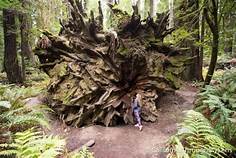
The author was either from the Netherlands or just read a book about them but I'm not believing everything that's coming out in this post. Some of the facts were mostly just opinion (the clearest water, most breathtaking sight)
Click the three dots and delete it. It will then be hidden.
Load More Replies...Many of these are incorrect or unproven. The article should be named "fantastic things a random twitter account claims without evidence but that would be slightly interesting if they were true"
Anyone else think WTF Facts needs to be turned into a Twilight Zone-style TV show telling some of these more incredible stories?
No? Like you’re gonna tune in and have Rod Serling be all “submitted for your approval, koalas sleep 22 hours a day, also here’s a closeup of a pyramid” and then wonder what’s the sociopolitical point it’s trying to make like the classic Twilight Zone.
Load More Replies...Woooooow! I did not know almost any of these facts! Thanks for sharing!
This person is standing at the roots of a redwood tree that fell in a windstorm. The proven source is me (although I'm not the one in the picture). root-605ff...e7eeaf.jpg 
The author was either from the Netherlands or just read a book about them but I'm not believing everything that's coming out in this post. Some of the facts were mostly just opinion (the clearest water, most breathtaking sight)
Click the three dots and delete it. It will then be hidden.
Load More Replies...
 Dark Mode
Dark Mode 

 No fees, cancel anytime
No fees, cancel anytime 

















